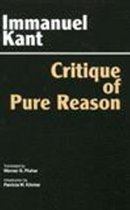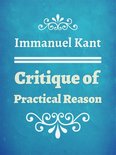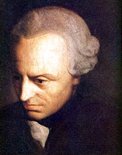Critique of Practical Reason
Afbeeldingen
Artikel vergelijken
- Engels
- Paperback
- 9780486434452
- 28 mei 2004
- 176 pagina's
Immanuel Kant
(Bron: Wikipedia. Beschikbaar onder de licentie Creative Commons Naamsvermelding/Gelijk delen.)"
Samenvatting
This Critique comprises three sections: the Analytic, the Dialectic, and the Doctrine of Method. The Analytic defines the ultimate moral principle, the categorical imperative, and argues that to obey it is to exercise a freedom. The Dialectic make the assumption that immortality and God exist, arguing that pure practical reason falls into error when it expects perfection in this world; we should anticipate finding perfection in the next world, with God's help. The final section, the Doctrine of Method, offers suggestions in educating people in the use of pure practical reason.
A seminal text in the history of moral philosophy, this volume offers the most complete statement of Kant's theory of free will and a full development of his practical metaphysics.
Productspecificaties
Inhoud
- Taal
- en
- Bindwijze
- Paperback
- Oorspronkelijke releasedatum
- 28 mei 2004
- Aantal pagina's
- 176
- Illustraties
- Nee
Betrokkenen
- Hoofdauteur
- Immanuel Kant
- Tweede Auteur
- Immanuel Kant
- Hoofduitgeverij
- Dover Publications Inc.
Vertaling
- Eerste Vertaler
- H.W. Cassirer
Overige kenmerken
- Extra groot lettertype
- Nee
- Product breedte
- 127 mm
- Product hoogte
- 13 mm
- Product lengte
- 203 mm
- Studieboek
- Ja
- Verpakking breedte
- 128 mm
- Verpakking hoogte
- 20 mm
- Verpakking lengte
- 202 mm
- Verpakkingsgewicht
- 187 g
EAN
- EAN
- 9780486434452
Je vindt dit artikel in
- Categorieën
- Taal
- Engels
- Boek, ebook of luisterboek?
- Boek
- Studieboek of algemeen
- Algemene boeken
Kies gewenste uitvoering
Prijsinformatie en bestellen
Alle bindwijzen en edities (8)
-
5,99Direct beschikbaar
-
3,99Direct beschikbaar
-
7,81Direct beschikbaar
-
0,99Direct beschikbaar
-
8,992 - 3 weken
Levertijd
We doen er alles aan om dit artikel op tijd te bezorgen. Het is echter in een enkel geval mogelijk dat door omstandigheden de bezorging vertraagd is.
Bezorgopties
We bieden verschillende opties aan voor het bezorgen of ophalen van je bestelling. Welke opties voor jouw bestelling beschikbaar zijn, zie je bij het afronden van de bestelling.
Tooltip -
14,992 - 3 weken
Levertijd
We doen er alles aan om dit artikel op tijd te bezorgen. Het is echter in een enkel geval mogelijk dat door omstandigheden de bezorging vertraagd is.
Bezorgopties
We bieden verschillende opties aan voor het bezorgen of ophalen van je bestelling. Welke opties voor jouw bestelling beschikbaar zijn, zie je bij het afronden van de bestelling.
Tooltip -
24,78Uiterlijk 11 mei in huis
Levertijd
We doen er alles aan om dit artikel op tijd te bezorgen. Het is echter in een enkel geval mogelijk dat door omstandigheden de bezorging vertraagd is.
Bezorgopties
We bieden verschillende opties aan voor het bezorgen of ophalen van je bestelling. Welke opties voor jouw bestelling beschikbaar zijn, zie je bij het afronden van de bestelling.
Tooltip -
59,992 - 3 weken
Levertijd
We doen er alles aan om dit artikel op tijd te bezorgen. Het is echter in een enkel geval mogelijk dat door omstandigheden de bezorging vertraagd is.
Bezorgopties
We bieden verschillende opties aan voor het bezorgen of ophalen van je bestelling. Welke opties voor jouw bestelling beschikbaar zijn, zie je bij het afronden van de bestelling.
Tooltip
Vaak samen gekocht
Rapporteer dit artikel
Je wilt melding doen van illegale inhoud over dit artikel:
- Ik wil melding doen als klant
- Ik wil melding doen als autoriteit of trusted flagger
- Ik wil melding doen als partner
- Ik wil melding doen als merkhouder
Geen klant, autoriteit, trusted flagger, merkhouder of partner? Gebruik dan onderstaande link om melding te doen.




















